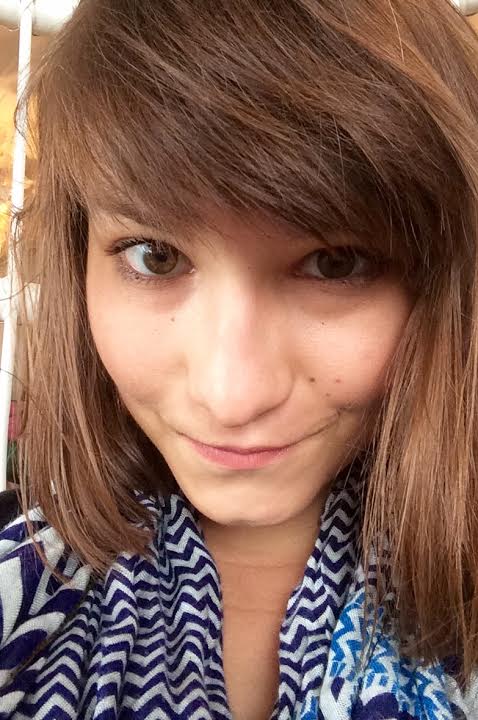High Yellow
The sign warns Do Not Touch. Anyone who has ever been to an art museum before understands this. There is even a limp string, roping off the space one foot from the wall. And still, the man reaches his hand forward. Slowly, as if he has never observed his arm move this way through air. The gallery assistant nearest to the impending incident speaks at the man, but he doesn’t flinch in shock/cringe in fear/flex in rebellion/not even a nod of juvenile embarrassment. Other assistants gather now—other patrons too—around him, forming a semi-circle. Around the man with the goldfinch on his shoulder.
His arm extends forward to a painting before him. He points at the glowing shape in front. The group believes this painting by the great minimalist Ellsworth Kelly to be a not-quite- round sun in a simple field of green. An obscure lemon blazing against a blue sky. The group suspects the man sees something quite different. He doesn’t blink. His eyes are wet, his movements soft.
The gallery assistants are awestruck, in fact all stuck in their cement-heavy shoes. There are children who whine. Why does he get to touch the art? they say. They are shushed immediately and given lollipops to keep them occupied. The man with the bird leans forward as spectators begin to pull out cameras and phones. His feet are behind the restraining rope to allow his torso to bend at the waist, cracking his spine slightly.
His forehead hovers reverentially over the yellow splotch. Then, he dips his head in, testing the waters, and a ripple travels to the edge of the sun. Then, the man’s whole face is inside the painting. The canvas jiggles like water, or just-put-on paint. It’s wet. It’s alive. An assistant leaves the semi-circle to check if the man’s face is visible from the other side of the wall. It’s not. The finch on the man’s shoulder chirps. It is the only sound echoing in the gallery.
He’s been under for over five minutes. The children are growing irritable and hungry. One woman leaves to go to the bathroom. She doesn’t come back.
Someone clears their throat and the bird chirps again. Now the man has pulled his head out. There is no notable difference from when he went in. He blinks now and steps back, observing the painting. He doesn’t seem to realize he still has an audience. The bird is beginning to chirp more frequently. The group feels anxious. They don’t understand the meaning of the bird’s quicker pace.
The high yellow sphere is expanding. Some group members refuse to believe that it’s growing bigger, but it is. The edges of the lemon sun squeeze and bulge against the tight, straight lines of the canvas. It cannot be contained. There’s nowhere for it to go, but out.
Forcefully, the yellow sun erupts out of the canvas’ chest. Too quick for a phone to capture. The gallery is submerged in a sea of yellow. The group looks up. Yellow. The group looks at their neighbors. Yellow. The group looks for hands, feet, noses, recognizable body parts or clothing. All yellow. And then the yellow evaporates into air. All except for the yellow which has clumped onto the man’s hair, his navel, his elbow patches, the backs of his knees. The sun has ripped through the painting and left a cavernous black hole. The museum’s air conditioning blasts on and waves the strands of loosened canvas like hair stressed with wind.
The man stumbles out of the museum doors into a sunless day. The goldfinch has not fared the blow too well. Its top half balances precariously on his shoulders, feathers unscathed. The commuters on the road gawk at the glowing man. The man sees nothing. Only from his periphery can he watch the toes of his shoes as they step on the everlasting pavement stretching out before him.
The group inside quickly forgets what they just encountered. The gallery assistants take their designated places once more. Some visitors continue their walk through the museum, while others leave to grab a lunch or ice cream cone. Meanwhile, the goldfinch’s bottom half can be found around the floors of the museum (meandering from Level 3 – Modern American Art to Level 2 – Roman Paper Vault). It parades itself proudly, keeping guard, keeping time. Until his master returns. Until his legs need to be wound up once more.
*
The man returns to his house. He sits on a couch, but not for long. He leaves an impression of yellow everywhere he goes. The man knows that yellow can take any shape. The hardwood ground beneath his barefeet are stained with flecks of yellow. The man takes a black marker and emboldens the circumference of drips. It is hard to tell what to do now. They all look the same to him. But he still has the bird. At least, a part of it. The part with the heart. The man points to each dot, waiting for five counts before moving on to the next. He moves through his entire house—the yellow has been where he has—and he waits for the bird to peck. Finally, it does, drawing blood even. This dot, this one he is pointing at right now, is it. The one he is looking for.
He crouches down and expands the minuscule circle with his fingers, like he does on his tablet when his eyes fail him and he needs a bigger font. The yellow grows in size. He holds it, feels it child heavy in his palms. He folds it over his arms. The man with the bird’s upper half used to wait tables in his youth. He likes the familiar weight of a thing draped on his forearm.
The man walks outside and flings the yellow high into the sky. It sticks, like a fly in a web. The splotch, the circle, gleams white with light.
The man bends forward, cracking the spine again. He winks at the bird on his shoulder. He loves his bird. And then, the bird is inside him, gracefully/cautiously/deftly turning muscle into wings and weight into air. There is a crashing of backbones breaking through skin and a flapping of heavy, clumsy feathers grasping for support from the wind.
And then the man, alone now and free, flies toward his sun, always remembering the other half of his bird, keeping guard somewhere, keeping time.
Limerence
WELCOME TO THE SHADOW EMPORIUM…
The words still haunt you after all these years. They buzz and bite and nip at your ears. They swarm like fleas, like hundreds of them—impossible to bat away.
You came to the Shadow Emporium as a young child, begging for a bit of food and a crumb of compassion. You had no family. You had no coat. You were eight years old and it could have been any ordinary door.
Now you are an apprentice, working as a Ravager in the Dark Room on weekdays and a Great Hall curator on the weekends.
Now you are in love.
That’s your word for it, but it’s unlike any love you’ve felt before. It’s painful. It squeezes the instep of your feet when you walk. Your heart is a ball of twine, so knotted that you’re ready to cut the string with the sharpest scissors you can find. She’s imprinted on you, or maybe you’ve imprinted on her. It’s hardest to tell when you rest your back against the canvas, her 2D figure matching perfectly to your curves. You color her within the lines. You can hold crayons while she cannot.
It wasn’t meant to happen. This Love. Limerence. Total enamored captivity.
She had come to you, to the Emporium, as all shadows came. First, captured on film. The bright flash dazing her like a drug. You grabbed her flat ankles while Lichen held her thin wrists between his index finger and thumb. We plunged her into the washbasin. Left her in confinement for three dark days. Stretched her onto the xylem canvas, elongating her limbs without the gift of sunset. She was elegant, lean, perfect. You chose Frame #3 on the left hand side, and stayed her ankles, knees, and wrists with push pins. A thrill rattled your hands as you touched her thighs, her slim arms, her neck, her pointed nose. Within seconds, you knew this shadow of a body. You promised you would care for it as if it were your own.
That night, you thought hard of the world she had left, of the life she might have led before this savage act. Before your Ravage duty. Before you stole her away from love, with love as your witness. You had ripped her doubled form from the ground, like you did the band-aid on your thumb. Had you left a mark? You wondered who still uttered her name in their sleep, whose breath grasped for answers among the murmur of crickets.
The Master had warned you not to name them, the shadows. Names are attachment. Names show connection, a familiarity intolerable within the Emporium. You realize that your fellow Ravagers themselves lack that access to your intimate identity. Names are sacred. And yet, you knew this shadow from the start. You knew her innermost self. You took her name and rolled it around your tongue, curating it. Protecting it. Now you utter it in your sleep and keep it under your pillow by day. You promised you would care for it as if it were your own.
The shadow has a sun spot. You surrender. It was you who forgot to draw the curtains as you closed down the Emporium last night. You who have damaged her. You ravager, you demon. You tell yourself it was an accident. A mistake that any decent curator couldn’t have made. She is found this morning, with a torso drained of color. You feel the pang inside you. You feel your own belly leach its acid onto your skin, burning a cylinder through your middle. Your heart’s fist tightens. You’re sorry. No, more than that. You’d do anything to cure her.
They take her down this afternoon, while you are at lunch. You never even got to say goodbye.
And so, you decide to steal the key to the backroom. Easy. There has been a large rainfall and the southern atrium’s roof is dribbling onto the floor. You offer to clean it up, despite your co- workers’ scoffs. You have a reputation of dismissing dirty work, but then again, you aren’t entirely yourself anymore. You are being compelled by an external force turned internal.
Something that is turning you inside-out. A twisted tie-dyed rag in desperate need of sun. You’ve become ravaged yourself.
Bloch gives you his keys, but you’re interested in only one of them. The GM. The key to your shadow. You start toward the Utility Closet to fetch the bucket that will collect the sky’s tears, a bucket that no longer holds coins and bread and sadness. You start toward the closet door, then jackknife to the left. You slink to the Trash Studio.
This is the place where you know she is. This is the place where broken shadows come to die.
She is there, propped up against the wall. Next to her, a shadow of a man is hunched over in an upside down U. He is wearing a droopy nightcap and you feel nothing for him. All that is there for you is her. She is dusty, the sun spot spreading. She is the shadow of a Hollywood actress, so she looks to you. An Ingrid Bergman, chin demurely resting on her shoulder. You look into the place where you know those eyes would have been, and you see a victim. A wounded animal.
She doesn’t look back. She can’t. It cripples you to think that she is suffering alone. She never was given the choice to become a shadow. One flash – and she faded to darkness. If she only knew what you would do for her to change everything.
You wonder if she thinks of you like you think of her.
She’s a shadow. Reciprocation stops at the activated shutter lens.
In a desperate act, you find a can of black paint. You will single-handedly help her recover. Your body moves without consulting your mind. You hate yourself as you do it. You could get fired for this. But you can’t stop. Dying occurs in stillness.
You don’t have a paintbrush, so you have to use your hands. First, the left hand. Dipping beneath the surface of the thick black syrup, disturbing the morbid peace. You inhale deeply the toxicity of the liquid licorice and let it blacken your lungs. Then, the right hand cools into the paint can, opening, then closing. Grabbing onto as much paint as you can. You press handfuls of glop onto your shadow’s stomach. Again, again, until the fingers mix with heels and the little lines of fortune teller’s trade become invisible.
There. You’ve fixed her.
Beyond the doors, you hear the grinding of a wood chipper. A canvas has been removed from the Emporium. There is one less shadow on our Earth.
Your heart swells, considering what you are about to do. But you must do it. Your heart thinks first. Your head can only nod in agreement.
With hands dipped in painted leather gloves, you kneel in prayer at her feet.
You want to tell her of the freedom you can give her, but you don’t want to ruin this silence. This love, this ache, that feels like forever. You can only hold onto this for so long. You falter. Then- plink –one push pin is out of her leg. A minuscule hole remains.
You should have never knocked on this door, you realize, all those years ago. You have been consumed. You have been changed. Who have you become? What are you now? You’re not sure if this all feels human anymore.
Footsteps? You move quickly. Plink – the other side. You rise to her upper body. The two of you really do look alike. This just might work.
Two more plinks, and she slithers to the ground. Disintegrates into earth. The canvas is all that remains of her past. Like a shedded snakeskin. Like lovers’ crumpled clothes on the floor.
Curating now, your mind preserves a life once ravaged. She is free, you hope. She has returned to her body and has appeared suddenly, back on her bike, you hope. She buys an apple from the market, gets her hair cropped to chin-cradling length, you think. She walks under the sun and can’t find her shadow, you know. She hasn’t stopped to think about you once. No, not you.
You weep at the sight of the empty canvas. It’s still so beautiful. Your memory, that monster, fills in the gaps of her absence. While your heart beats on. While the footsteps come closer. Their echoes push against your chest.
The camera is in your hands. You extend your arm and turn it away from you, so the viewfinder faces the opposite wall and the fish-eye lens convexes into your soul. Back presses onto canvas. It feels differently, now that she’s not there. Rougher like burlap. There’s nothing left.
Your shoulder perks up and your chin instinctively draws to it. You, her, and Ingrid Bergman, layered in this silhouette. Your finger shakes and presses down on the shutter. Release to gray.



